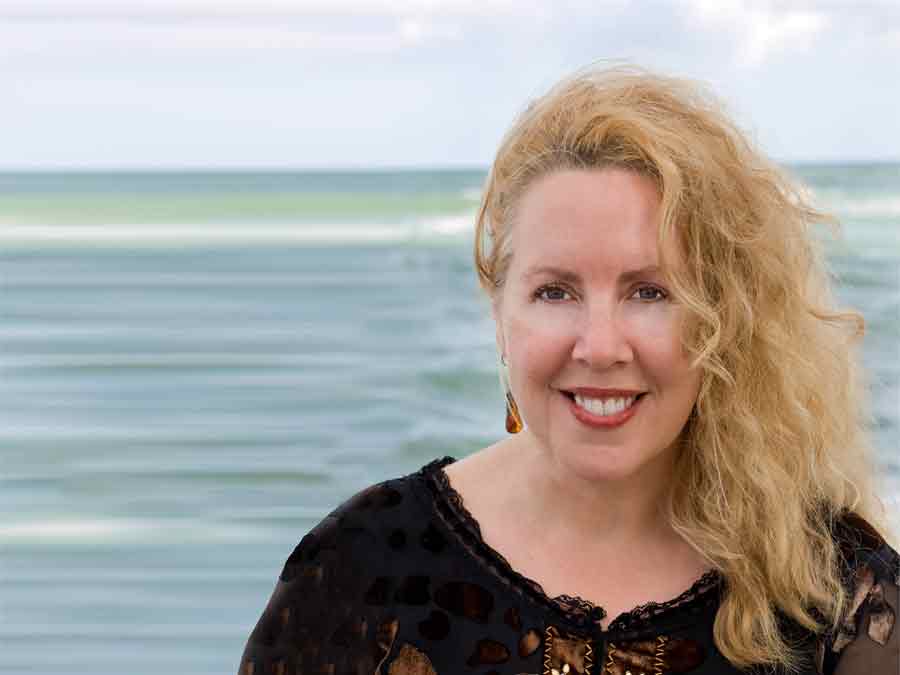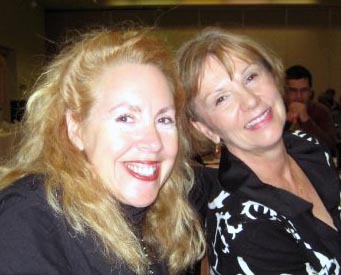Interview with Denise Duhamel
By Karla Huston

Friendships can begin in strange and wonderful ways. One good way to connect is by taking a class. I’ve done this often, traveling as far as Vermont or as close as Iowa. In fact the Iowa Summer Writing Festival is a good choice for Wisconsinites because it’s close; and the Iowa program offers weekend workshops, a boon for those who don’t want to commit an entire week.
Commit an entire week, I did, in 2000 when, with Cathryn Cofell, I took a class with Denise Duhamel. We’d registered for an advanced poetry class entitled, “Writing Beyond Taboo.” This seemed like the perfect fit for two wild Appleton women who wanted to push the limit, press more than a few buttons. We were ready. We’d brought our Rollerblades to get back and forth to class. We’d brought laptops and a printer, plenty of red wine. We’d even considered a visit to the tattoo parlor. And wasn’t this the time when Omar and Oscar, two agri-business students at UA, hit on us in the Deadwood Tavern, where we’d gone to copy the graffiti off the bathroom walls for “found poetry”? Unfortunately, the stalls had been repainted, so our plans for collaboration with the likes of Elvis and Margo from Fargo who seemed to do everyone were dashed.
At our first class meeting, introductions were made. Give a bit of personal background and our expectations, Denise suggested. As the preambles began, I had a creepy feeling that I was somehow in the wrong room. First there was the woman, a twin, who admitted she suffered from bulimia and was ritually abused by her grandparents. The next woman confessed to being schizophrenic but on medication; and the next, a man named Bob, said he liked writing poems about women’s body parts and proved it, often referring to alabaster orbs and the golden, netted curtain. Another was a young woman who’d never written a poem before (wasn’t this an advanced class?). Then, there was Penny from Australia, who walked barefoot everywhere, her long, Gypsy skirts swirling. She said she was lesbian, a social worker, daughter of an unnamed famous Australian psychiatrist, and into sadomasochism.
When the table-talk came round to us, Cathryn confessed to being Catholic. But I had no such terrifying admission. I was Lutheran with no encroaching guilt issues, and like Mary Poppins, a life that was “practically perfect” in every way. We were both there, we’d confessed, to learn to write good poems. Over the course of the week, we got to know each other. Bob tried to seduce us after his third martini at the banquet. The Australian invited us to visit but warned that someone had a “hit” out on her, so she’d be hard to find. Sadly, the bulimic was often heard retching in the bathroom across the hall after lunch.
Duhamel, however, was gracious and patient and encouraging, providing enough good prompts to keep Cathryn and me busy typing most mornings. I wrote more new work that week than any class before or since. And since, Denise and I have remained friends; she contributed significantly to my MA thesis: www.margiereview.com/CHAUTAUQUAS/huston.html . As well she and I have done two interviews which were published in print and online: http://www.smartishpace.com/interviews/denise_duhamel/.
If you missed her at the fall (2009) Wisconsin Fellowship of Poets’ conference, you missed a special experience indeed. In not one, but two presentations, Duhamel spoke about collaboration and using humor in poetry. She is an expert on both. In fact, after listening to a presentation at that same Iowa conference, Cathryn and I began writing collaboratively, too.
you missed a special experience indeed. In not one, but two presentations, Duhamel spoke about collaboration and using humor in poetry. She is an expert on both. In fact, after listening to a presentation at that same Iowa conference, Cathryn and I began writing collaboratively, too.
Pictured: Denise Duhamel & Karla Huston, WFOP, 2009.
From my 2004 interview, Duhamel’s poetry has been described as “stunning, suggestive, and startling. Her poems speak with a wild irreverence. Not afraid of critics and naysayers, Duhamel experiments with form and subject, creating poetry that challenges the reader’s notion of what poetry should be. She presents what poetry could be as she fully engages pop culture, the joys and horrors of it, while maintaining the ability to poke fun at our foibles—and make us think.”
To experience a Duhamel poem is to take a wild or sometimes harrowing ride. Maybe she’s gotten a bit crazy about money (Ka-ching!), or more than terrifying as she recounts the moments of September 11, 2001, or her own parents' horrifying fall down an escalator in Atlantic City. Duhumel has something to say.
I had the chance to ask her a few questions via email recently.
Karla Huston: One of your books, The Woman with Two Vaginas (Salmon Run Press, 1995), a poetic retelling of Inuit myths, has been banned in Canada for years. I’m guessing you don’t believe in censorship. As a writer, how does this make you feel?
Denise Duhamel: The Woman with Two Vaginas is out of print, so I guess it’s a moot point as to whether or not it is still banned. A streak of terror went through me when I first heard it was banned, but now I wear it as a badge of honor and in solidarity with all the other banned writers.
KH: The first time we met was in a class in Iowa City ten years ago. You teach at Florida International University and in a low-residency MFA program at Converse College in South Carolina as well as summer workshops around the country. How long have you been teaching? What does teaching give you as a writer that working as an insurance agent or a nurse doesn’t?
DD: The old joke is: What are the three main reasons to become a teacher? June, July, and August. I do think that teaching gives me more free writing time than other occupations. I also like teaching because I am constantly getting to talk about writing and books I love. I have been teaching (gulp) since 1985.
KH: Yes, I agree. Teaching gave me permission to talk poetry and to buy books—which I did, both, in copious amounts. Is there a different dynamic between teaching a workshop versus teaching a regular class?
DD: Students are much more vulnerable in a workshop situation than a regular class. Poetry invites students to write about their feelings more than they might do in prose. Students sometimes reveal more about themselves than they realize they are revealing and then feel embarrassed. It’s much harder to grade a poem than an essay. It’s much harder to critique creative work. Still, I am comfortable now doing workshops. I enjoy sitting in a circle with people rather than standing in front of a classroom with a piece of chalk.
KH: When I was teaching, some days I’d have rather graded an essay. At least there were specific criteria for an essay. But there was something about creative work that I enjoyed. I think I just loved teaching poetry. I’m trying to imagine you with a piece of chalk in your hand! So many of your poems use humor or irony. Were you always funny? You say you started writing fiction. Was your fiction filled with humor, too?
DD: I think I became funny by mistake. I tended to be melodramatic and gloom and doom when I was younger and people laughed at me. So I hammed it up, I guess, and at some point tried to be funny with a purpose. Yes, I did try to write funny fiction.
KH: You’ve recently published a collaboration with Amy Lemmon called ABBA the Poems. (Coconut Books, 2010) According to your process notes, the poems use an ABBA rhyme scheme in eight quatrains, and must include a reference to the musical group ABBA. Amazing! And what fun! You add that the poems were written via email, one line at a time. How long did each poem take to write? How did you revise?
DD: I think our project took over two years. The poems with additional constraints (like palindromes or all “o” sounding endings) took quite a while. We were slow and methodical actually. Amy was moreso than I was. We were able to “keep” most of the poems we wrote.
KH: I know poets read other poets and reading is essential for lots of good reasons. But when you’re not reading other poets, what kinds of books do you like? Mystery? Romance? Literary fiction?
DD: I really love young adult novels. Francesca Lia Block, Peter Johnson, Lisa Glatt, Ron Koertge, and David Hernandez are among my favorite YA novelists. Teenagers, I think, feel more and experience more in a novel than other characters. Each teenager encounters a new generation and cultural norms, and the way they buck against those norms is fascinating to me. I love the bridge between childhood and adulthood.
KH: Interesting that some of these authors (Glatt, Koertge, Hernandez) are also poets. Do you think about writing fiction again?
DD: Yes! In Ka-ching! I have a long poem called “Lucky Me” about my rejection in the fiction world, so I’m a little superstitious to say I’m working on anything. If my current project doesn’t work out, I can always write another poem about my failure.
KH: When can readers expect your next book?
DD: I’m not sure. Maybe 2013? I have my chapbook projects to keep me going until then. One is called Help in 47 Languages, and the prose poems all fit into frames I found on sale for a penny a piece in a craft store. Each poem has the title “HELP” from a different language and uses the word help (in English) at least once. The inspiration was from a rumor that when the famous linguist William Jacobsen was struck by a car, he shouted, “Help!” in 47 languages.
KH: As the author of numerous books and chapbooks of poetry on your own and in collaboration, do you have a favorite?
DD: No favorites. It’s kind of like admitting you have a favorite kid.
KH: Once when I asked if you were bothered by critics’ sometimes-tough comments, you said, if you believed the criticism, you must believe the praise. How hard is this to do?
DD: It is hard not to want everyone to think you’re doing great work. I just noticed I wrote that last sentence in the second person because it’s easier to do so. So when I say “you,” I mean “me.” You can’t be an artist and expect everyone to love your work and feel comfortable with it. You have to ruffle feathers. That’s part of the job description. So a bad review is better than no review at all.
KH: Speaking of publications that ruffle a few feathers—if there were a National Enquirer headline about you, what would it say?
DD: “DNA Tests Prove Poet Denise Duhamel is the Love Child of Frank O’Hara and Anne Sexton.”

